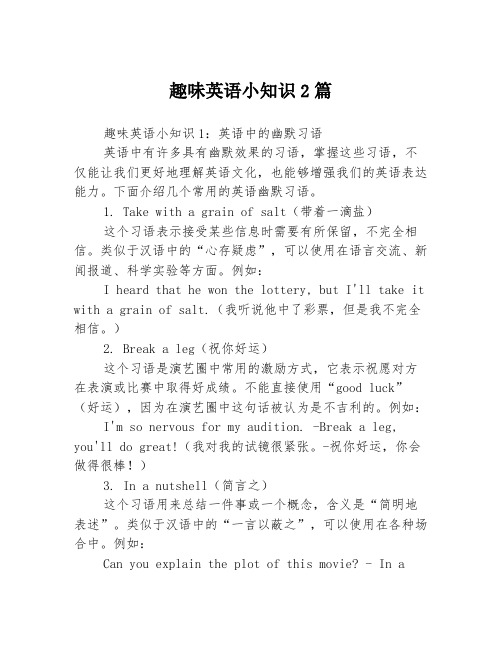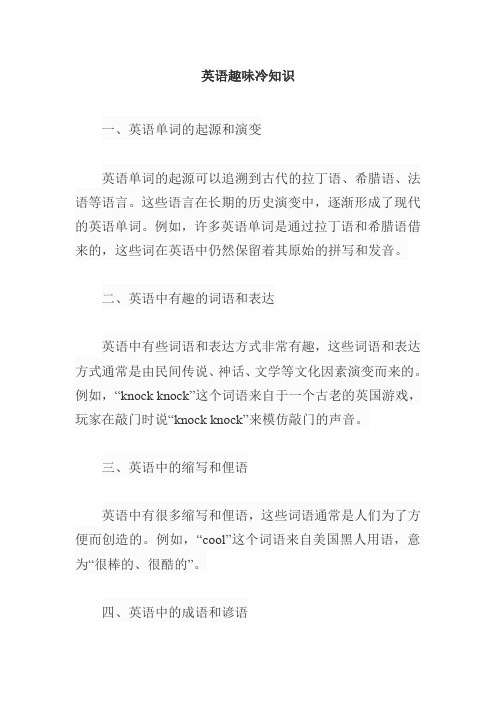英语趣味小知识
- 格式:docx
- 大小:16.33 KB
- 文档页数:10

英语趣味小知识Fun Facts About EnglishEnglish is a fascinating and versatile language, with a rich history and many interesting quirks. Here are some fun facts about the English language:1. Did you know that English is the third most widely spoken language in the world, after Mandarin Chinese and Spanish? It is estimated that over 1.5 billion people speak English to some degree.2. English is a language with a large vocabulary. There are over 170,000 words in current use in the English language. However, it is estimated that there are over a million words in total, including obsolete and technical terms.3. Have you ever wondered why the English alphabet has 26 letters? It's actually because of the Latin alphabet, which was adopted by the English during the Middle Ages. The Latin alphabet originally had 23 letters, but the English added three additional letters: J, U, and W.4. English is known for its many irregular verbs, but did you know that there is one verb that has only one form for all its tenses? The verb "to be" is the only verb in English that doesn't change its form. For example, the past tense of "to be" is "was" for both singular and plural subjects.5. English is also famous for its spelling inconsistencies. There aremany words in English that are spelled differently from how they are pronounced. For example, the word "colonel" is pronounced "kernel." This can make English difficult to learn for non-native speakers.6. English is constantly evolving and changing. New words and phrases are added to the English language every year. In fact, the Oxford English Dictionary adds around 1,000 new words every year. Some recent additions include "selfie," "binge-watch," and "FOMO" (fear of missing out).7. The shortest complete sentence in English is "I am." It has a subject (I) and a verb (am) and is grammatically correct.8. English is the official language of the skies. Pilots and air traffic controllers are required to speak English to ensure clear and efficient communication.9. English has more words than any other language. While many languages have borrowed and adapted English words, English has borrowed words from almost every other language in the world as well.10. Finally, did you know that the word "e" is the most commonly used letter in English? It appears in approximately 11% of all written English.These fun facts about the English language are just a glimpse into the complexity and diversity of this fascinating language. Whetheryou are a native speaker or learning English as a second language, there is always something new to discover and explore.。


趣味英语小知识2篇趣味英语小知识1:英语中的幽默习语英语中有许多具有幽默效果的习语,掌握这些习语,不仅能让我们更好地理解英语文化,也能够增强我们的英语表达能力。
下面介绍几个常用的英语幽默习语。
1. Take with a grain of salt(带着一滴盐)这个习语表示接受某些信息时需要有所保留,不完全相信。
类似于汉语中的“心存疑虑”,可以使用在语言交流、新闻报道、科学实验等方面。
例如:I heard that he won the lottery, but I'll take it with a grain of salt.(我听说他中了彩票,但是我不完全相信。
)2. Break a leg(祝你好运)这个习语是演艺圈中常用的激励方式,它表示祝愿对方在表演或比赛中取得好成绩。
不能直接使用“good luck”(好运),因为在演艺圈中这句话被认为是不吉利的。
例如:I'm so nervous for my audition. -Break a leg,you'll do great!(我对我的试镜很紧张。
-祝你好运,你会做得很棒!)3. In a nutshell(简言之)这个习语用来总结一件事或一个概念,含义是“简明地表述”。
类似于汉语中的“一言以蔽之”,可以使用在各种场合中。
例如:Can you explain the plot of this movie? - In anutshell, it's about a group of friends who try tosave their hometown from an evil corporation.(你能解释一下这部电影的情节吗?-简言之,它讲述了一群朋友试图拯救他们的家乡免遭邪恶集团的侵袭。
)4. Make a long story short(长话短说)这个习语用来概括或总结一个故事,表示让语言简明扼要一些。

英语趣味知识点小学六年级英语是全球通用的语言之一,学习英语不仅能够为我们提供更多的交流机会,还能够增加我们的知识面和对不同文化的理解。
为了让小学六年级的同学更有趣地学习英语,我整理了一些趣味知识点,希望能够帮助大家更好地掌握英语。
下面是我为大家准备的十个趣味知识点。
知识点一:英文字母26个英文字母是我们学习英语的基础,它们是:A,B,C,D,E,F,G,H,I,J,K,L,M,N,O,P,Q,R,S,T,U,V,W,X,Y和Z。
英文字母可以用来拼写单词和句子,每个字母都有自己的发音。
知识点二:英文数字英文数字与中文数字有一些区别,例如,0是“zero”,1是“one”,2是“two”,依此类推。
我们可以用英文数字来表示年龄、电话号码、日期等等。
知识点三:问候语在英语中,我们有不同的问候语来表示不同的场景。
例如,早上见面时可以说“Good morning”,下午见面时可以说“Good afternoon”,晚上见面时可以说“Good evening”。
这些问候语可以帮助我们在不同的时间段用英语与他人交流。
知识点四:动物英文名学习动物的英文名字可以帮助我们扩展自己的英语词汇量。
例如,狗是“dog”,猫是“cat”,鸟是“bird”,兔子是“rabbit”,大象是“elephant”等等。
通过学习动物的英文名字,我们可以更好地了解动物世界。
知识点五:颜色学习颜色的英文名字也是很有趣的。
例如,红色是“red”,蓝色是“blue”,绿色是“green”,黄色是“yellow”,紫色是“purple”,橙色是“orange”等等。
通过学习颜色的英文名字,我们可以更好地描述周围的环境。
知识点六:日常用语日常用语是我们在生活中经常使用的英语表达。
例如,谢谢是“thank you”,对不起是“sorry”,请是“please”,早上好是“good morning”等等。
通过学习这些日常用语,我们可以更好地与他人交流。

26个英文字母趣味知识点一、字母的起源。
1. 英文字母源于拉丁字母,拉丁字母又源于希腊字母,而希腊字母则是由腓尼基字母演变而来的。
腓尼基字母是世界字母文字的开端,大约公元前13世纪就已经出现了。
2. 例如,字母A最初的样子像一个倒置的牛头,在腓尼基字母中它表示“牛”的意思,经过不断的演变才成为现在我们看到的样子。
二、字母的大小写。
1. 大写字母通常用于句首、标题、专有名词等。
例如,“I love China.”中的“I”是句首字母,要用大写;“Beijing”是专有名词,首字母也要大写。
2. 小写字母在一般的句子书写中使用更为频繁。
大小写字母在形状和书写规则上有很多不同之处,像小写字母“a”和大写字母“A”,它们的形状差别很大,书写时大小写字母的占格也有所区别。
三、字母的读音。
1. 字母的读音分为元音字母和辅音字母。
元音字母(a, e, i, o, u)在单词中的发音比较复杂多样。
例如,字母“a”在“cat”中发[æ],在“cake”中发[eɪ]。
2. 辅音字母的读音相对比较固定,但也有一些特殊情况。
比如字母“c”,在“cat”中发[k],在“city”中发[s];字母“g”在“go”中发[g],在“giant”中发[dʒ]。
四、字母的书写顺序。
1. 大写字母:- 大写字母“A”的书写顺序是先写一横,再写斜着的两笔。
- 大写字母“B”是从上到下先写一竖,再写两个半圆。
- 大写字母“C”一笔写成一个半圆。
- 大写字母“D”先写一竖,再写半圆。
- 大写字母“E”先写一横,再写中间一横,最后写下面一横。
- 大写字母“F”先写一横,再写中间一竖,最后写一横。
- 大写字母“G”先写一个半圆,再写一竖和一个小弯钩。
- 大写字母“H”先写两竖,再写一横。
- 大写字母“I”一笔写成一竖,大写时上面和下面都要加一横。
- 大写字母“J”先写一竖,再写一个小弯钩。
- 大写字母“K”先写一竖,再写一撇一捺。
- 大写字母“L”一笔写成一竖。

英语趣味冷知识一、英语单词的起源和演变英语单词的起源可以追溯到古代的拉丁语、希腊语、法语等语言。
这些语言在长期的历史演变中,逐渐形成了现代的英语单词。
例如,许多英语单词是通过拉丁语和希腊语借来的,这些词在英语中仍然保留着其原始的拼写和发音。
二、英语中有趣的词语和表达英语中有些词语和表达方式非常有趣,这些词语和表达方式通常是由民间传说、神话、文学等文化因素演变而来的。
例如,“knock knock”这个词语来自于一个古老的英国游戏,玩家在敲门时说“knock knock”来模仿敲门的声音。
三、英语中的缩写和俚语英语中有很多缩写和俚语,这些词语通常是人们为了方便而创造的。
例如,“cool”这个词语来自美国黑人用语,意为“很棒的、很酷的”。
四、英语中的成语和谚语英语中有很多成语和谚语,这些语句通常是由一些经典的文学作品中的名言警句演变而来的。
例如,“All’s well that ends well”(结局好就一切都好)这句谚语来自莎士比亚的戏剧《朱丽叶与罗密欧》。
五、英语中的文化差异和语言习惯英语在不同的国家和地区有着不同的文化差异和语言习惯。
例如,英国人喜欢在口语中使用“um”和“er”等词语来表示思考或犹豫,而美国人则更倾向于使用“uh”或“mm-hmm”。
六、英语中的历史和文学典故英语中有很多历史和文学典故,这些典故通常来自于一些经典的历史事件或文学作品。
例如,“Romeo and Juliet”(罗密欧与朱丽叶)这个典故来自于莎士比亚的同名戏剧,形容两个恋人之间悲惨的爱情故事。
七、英语中的趣味拼写和发音英语中有些单词的拼写和发音非常有趣,这些单词通常是由一些特殊的文化或历史因素演变而来的。
例如,“honey”(蜂蜜)这个单词在美式英语中发音为“honee”,这正是因为在古代英语中,“honey”这个单词的发音类似于“honee”。
英语小知识点有趣英语是一门世界性的语言,在我们的日常生活中扮演着重要的角色。
下面,我将为大家介绍一些有趣的英语小知识点。
1. 形容词的顺序在描述某个事物时,我们需要用到多个形容词。
但是你知道吗?形容词的顺序是有规律的。
一般来说,我们需要按照以下顺序排列形容词:限定词(a, an, the)- 观点形容词(beautiful, ugly)- 尺寸形容词(big, small)- 形状形容词(round, square)- 年龄形容词(young, old)- 颜色形容词(red, blue)- 原产地形容词(Chinese, American)- 材料形容词(wooden, metal)- 目的形容词(cooking, sleeping)- 名词。
2. 英语倒装句倒装句在英语中是一种常见的语法结构。
在一些特定情况下,主语和谓语的位置会发生调换。
例如,当表达否定含义、使用副词表达方式或使用特定短语时,我们就需要使用倒装句。
例如:"Not only did he pass the exam, but he also got a high score." 或者"Hardly had I started my work when my boss called me."3. 常见的英语口语错误在学习英语口语过程中,我们难免会犯一些错误。
下面列举了一些常见的英语口语错误,希望能帮助大家避免这些错误:混淆 "your" 和 "you're"、错误使用时态、错误的主谓一致、使用错误的介词以及错误的发音。
4. 世界上最长的单词据Guinness World Records 记载,英语中最长的单词是"Pneumonoultramicroscopicsilicovolcanoconiosis",它总共有45个字母。
有趣的英语小知识与短篇故事有趣的英语小知识与短篇故事如果大家仔细观察会发发现学习英语也是很有趣的一件事情的,因为英语是有很多小知识与短篇故事都是幽默有趣的。
快来看看店铺为你准备了有趣的一些英语小知识与短篇故事,欢迎大家阅读!有趣的英语小知识1. WAS IT A CAR OR A CAT I SAW.. 'WASITACARORACATISAW'.. This is the only English sentence which even if we read in reverse, it'll give the same sentence.“WAS IT A CAR OR A CAT I SAW”(我看到的是一辆车还是一只猫)这是英语中唯一一句反过来念还是一样的句子。
2. Aoccdrnig to a rscheearch procejt at Cmabrigde Uinervtisy, it deosnt mttaer waht oredr the ltteers in a wrod are, the olny iprmoatnt tihng is taht the frist and lsat ltteer be in the rghit pclae. Tihs is bcuseae the huamn mnid deos not raed ervey lteter.剑桥大学的研究表明:单词中字母的顺序如何不重要,重要的是第一个和最后一个字母的位置。
这是因为大脑在阅读时不会读到所有字母。
3. "Goodbye" came from "God bye" which came from "God be with you."英语单词“Goodbye”来自于“God bye”,原意是“上帝与你同在”。
4. The sentence "The quick brown fox jumps over a lazy dog." uses every letter of the alphabet!“The quick brown fox jumps over a lazy dog.”(这只敏捷的棕色狐狸跳过了一只懒狗)这句话用到了字母表中的所有字母!5. 'Go', is the shortest complete sentence in the English language.“Go”是英语中最短的完整句子。
英语趣味文化小知识1. The word "hamburger" comes from the city of Hamburg in Germany, where sailors used to eat a sandwich made of a piece of meat between two slices of bread.2. In the United Kingdom, it is considered bad luck to walk under a ladder, and it is also considered unlucky to open an umbrella indoors.3. In Japan, it is considered impolite to eat while walking, and it is also considered rude to pass food from chopstick to chopstick.4. In the United States, it is customary to tip restaurant servers, taxi drivers, and other service workers.5. In Mexico, it is customary to eat with your hands, and it is considered rude to eat with a fork and knife.6. In India, it is customary to eat with your right hand, and it is considered rude to eat with your left hand.7. In Russia, it is customary to drink toasts with a clink of glasses, and it is considered rude to drink from the same glass as someone else.8. In the United Kingdom, it is customary to say "cheers" when drinking, and it is considered rude to say "bottoms up."9. In China, it is customary to give gifts when visiting someone's home, and it is considered rude to decline a gift.10. In Japan, it is customary to bow when greeting someone, and it is considered rude to stand too close to someone when speaking to them.。
趣味英语知识大全(绝大多数的人不知道的英语趣味知识)Teach a fish how to swim.你听说过有不会游泳的鱼吗你听说过鱼因不会游泳而淹死的事吗如果谁有这样的担忧,必定会成为人们茶余饭后的笑料。
作为一种本能,鱼儿天生就是会游泳的0,如果有人想教鱼儿how to swim,这和在鲁班门前舞弄斧子又有什么差异呢因此,teach a fish how to swim 的含义就是“ 班门弄斧”MermaidMermaid 就是传说中的美人鱼,有人类的头和身体,但是长着一条鱼的尾巴。
Mermaid 这个词由两部分构成,mer和maid,这两个词都是从古英语中来的,分别为mere(海洋)和mayde(少女)。
Mermaid 还有一个相对应的Merman,用来表示男性人鱼。
It's raining cats and dogs.相信孩子们都见过“To rain cats and dogs”,知道它的意思是“下倾盆大雨”,但是有人要问了为什么英语中用“cats and dogs”来形容雨下得大,而不是“hippopotamus”(河马), “elephants”(大象), “buckets”(篮子)之类的东西。
虽然最早的起源无从考究,但其中一种说法是:“cats and dogs” 发音和法语词“catdoupe”(waterfull and cataract;大瀑布,大洪水)很像,所以人们听着听着就说成“cats and dogs”了。
Walk on eggs.我们常以“如履薄冰”形容一个人做事十分小心谨慎,像在薄冰上步行。
英语中类似的说法是walk on eggs,或者tread on eggs,就是非常小心地步行的模样。
Walk on eggs 令人想起放轻脚步走路。
美国俚语以walk soft指言行平静:He walks a lot softer than before(他比以前文静多了)。
英语趣味小知识 让我们学习一些有趣的小知识吧。以下是一些的英语和汉语对手指的称呼:
1.thumb :大拇指。与汉语相映成趣的是,英语的all(fingers and ) thumbs也表示"笨手笨脚"的意思,例如:(1)I'm all fingers and thumbs this morning. I don't seem to be able to button up my shirt.今天早上我的手怎么这么笨呢,好像连衬衫都扣不上了。(2)He was so excited that his fingers were all thumbs and he dropped the teacup.他激动得手都不好使了,竟把茶杯摔了。
2. forefinger :又称index finger,即食指。前缀fore-表示"位置靠前的"(placed at the front),所以从排位上说,forefinger应为"第一指"。从功用上看,此手指伸出时有标示或指向的作用。在一些英语工具书中,我们会见到这样的表示"参见"(index)含义的手型符号。
3. middle finger :中指。此指居中,名正言顺,且与汉语说法也一致。 4. ring finger:无名指。从世界各地的婚俗习惯来说,结婚戒指(wedding ring)戴在这一手指(通常指左手)之上,表示已婚。
5. little finger: 顾名思义为小指。在美国和苏格兰,人们又赋予它一个爱称,管pinkie(pinky),后缀-ie(-y)有"小巧可爱"之意。和时间有关的英语趣味小知识职场英语 2010-02-24 17:52:16 阅读264 评论0???字号:大中小 订阅
和时间有关的英语趣味小知识 (一) 时间是金,其值无价 1. Time is money.(时间就是金钱或一寸光阴一寸金) 2. Time flies.(光阴似箭,日月如梭) 3. Time has wings.(光阴去如飞) 4. Time is a file that wears and makes no noise.(光阴如锉,细磨无声) 5. Time stays not the fool's leisure.(时间不等闲逛的傻瓜) 5. Time and I against any two.(和时间携起手来,一人抵两人) 6. Time is life and when the idle man kills time, he kills himself.(时间就是生命,懒人消耗时间就是消耗自己的生命。或时间就是生命,节省时间,就是延长生命)
7. Time spent in vice or folly is doubly lost.(消磨于恶习或愚行的时间是加倍的损失)
(二) 时间是风,去而不返 8. Time undermines us.(光阴暗中催人才。或莫说年纪小人生容易老) 9. Time and tide wait for no man.(岁月不待人) 10. Time cannot be won again.(时间一去不再来) 11. Time is , time was , and time is past.(现在有时间,过去有时间,时间一去不复返) 12. Time lost can not be recalled.(光阴一去不复返) 13. Time flies like an arrow , and time lost never returns. (光阴似箭,一去不返) (三)时间是尺,万物皆检 14. Time tries friends as fire tries gold.(时间考验朋友,烈火考验黄金) 15. Time tries truth.(时间检验真理) 16. Time is the father of truth.(时间是真理之父) 17. Time will tell.(时间能说明问题) 18. Time brings the truth to light.(时间使真相大白。或时间一到,真理自明。) 19. Time and chance reveal all secrets.(时间与机会能提示一切秘密) 20. Time consecrates: what is gray with age becomes religion.(时间考验一切,经得起时间考验的就为人所信仰)
21. Time reveals(discloses) all things.(万事日久自明) 22. Time tries all.(时间检验一切) (四)时间是秤,衡量权质 23. There is no time like the present.(现在正是时候) 24. Take time by the forelock. (把握目前的时机) 25. To choose time is to save time.(选择时间就是节省时间) 26. Never put off till tomorrow what may be done today.(今日事,今日毕) 27. Procrastination is the thief of time.(拖延为时间之窃贼) 28. One of these days is none of these days.(拖延时日,终难实现。或:改天改天,不知哪天)
29. Tomorrow never comes.(明天无尽头,明日何其多) 30. What may be done at any time will be done at no time.(常将今日推明日,推到后来无踪迹)
(五)时间是水,淘金流沙 31. Time works wonders.(时间可以创造奇迹或时间的效力不可思议) 32. Time works great changes.(时间可以产生巨大的变化) 33. Times change.(时代正在改变) 关于地铁的英文小知识 tube与subway,underground及metro都表示地铁 tube 英式英语 London TUBE 伦敦地铁 Underground 英式英语,地铁 London Underground 伦敦地铁 Sound Of The Underground地铁的声音 subway ,美式英语,即underpass (过马路的)地道; [美]地下铁道[列车], 地下(电缆)管道
这在国内使用比较广 Subway map地铁地图 Metro 伦敦地下铁道, 地下铁道 深圳地铁SHENZHEN METRO 国内,东京,法国,欧洲大都使用 法语:le plan du metro地铁线路图 How do I get to the metro station? 请 问 如 何 前 往 地 下 铁 路 站 ? ( Metro 乃 欧 洲 常 用 字 )? How do I get to the subway station? 请 问 如 何 前 往 地 下 铁 路 站 ? ( Subway 乃 北 美 洲 常 用 字 )? How do I get to the underground station? 请 问 如 何 前 往 地 下 铁 路 站 ?
( underground 乃 英 国 常 用 字 )? 趣味英语小知识 1. Aoccdrnig to a rseearch procejt at Cmabrigde Uinervtisy, it deosnt mttaer waht oredr the ltteers in a wrod are, the olny iprmoatnt tihng is taht the frist and lsat ltteer be in the rghit pclae. Tihs is bcuseae the huamn mnid deos not raed ervey lteter.
剑桥大学的研究表明:单词中字母的顺序如何不重要,重要的是第一个和最后一个字母的位置。这是因为大脑在阅读时不会读到所有字母。
(小编注:大家在读上面这句看起来有点乱码的句子时,有注意到单词字母的顺序吗?)
2. WAS IT A CAR OR A CAT I SAW.. 'WASITACARORACATISAW'.. This is the only English sentence which even if we read in reverse, it'll give the same sentence.
“WAS IT A CAR OR A CAT I SAW”(我看到的是一辆车还是一只猫)这是英语中唯一一句反过来念还是一样的句子。
3. "Goodbye" came from "God bye" which came from "God be with you." 英语单词“Goodbye”来自于“God bye”,原意是“上帝与你同在”。 4. The sentence "The quick brown fox jumps over a lazy dog." uses every letter of the alphabet!
“The quick brown fox jumps over a lazy dog.”(这只敏捷的棕色狐狸跳过了一只懒狗)这句话用到了字母表中的所有字母!
5. 'Go', is the shortest complete sentence in the English language. “Go”是英语中最短的完整句子。 6. The onion is named after the Latin word 'unio' meaning large pearl. 单词“onion”(洋葱)来自于拉丁词“unio”,意思是大珍珠。 7. The word Tips is actually an acronym standing for 'To Insure Prompt Service'.
单词“tips”(小费)实际上是“To Insure Prompt Service”(保障快捷的服务)的首字母缩写!
8. The phrase 'rule of thumb' is derived from and old English law which stated that you couldn't beat your wife with anything wider than your thumb.